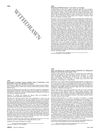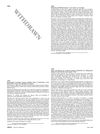 66 citations,
February 2013 in “Pediatric Dermatology”
66 citations,
February 2013 in “Pediatric Dermatology” Dermoscopy improves diagnosis and treatment monitoring for children's skin infections, inflammations, and hair disorders.
 46 citations,
March 2015 in “Regeneration”
46 citations,
March 2015 in “Regeneration” Mice can grow new hair follicles after skin wounds through a process not involving existing hair stem cells, but requiring more research to understand fully.
 44 citations,
January 2013 in “International Journal of Trichology”
44 citations,
January 2013 in “International Journal of Trichology” Finasteride 5 mg/day effectively treats hair loss in postmenopausal women without hyper-androgenism.
 39 citations,
July 2021 in “Stem Cell Research & Therapy”
39 citations,
July 2021 in “Stem Cell Research & Therapy” Using fat stem cells and blood cell-rich plasma together improves healing in diabetic wounds by affecting cell signaling.
 35 citations,
January 2013 in “Indian Journal of Dermatology, Venereology and Leprology”
35 citations,
January 2013 in “Indian Journal of Dermatology, Venereology and Leprology” Intralesional triamcinolone acetonide is effective for treating patchy hair loss, and dermoscopy helps detect treatment response and side effects early.
 30 citations,
December 1999 in “International Journal of Dermatology”
30 citations,
December 1999 in “International Journal of Dermatology” Oral ivermectin effectively cured scabies with minimal side effects, and finasteride promoted hair growth in men with hair loss.
 28 citations,
August 2000 in “Current Opinion in Chemical Biology”
28 citations,
August 2000 in “Current Opinion in Chemical Biology” Future osteoporosis treatments should focus on increasing bone growth, with many promising options available.
 22 citations,
February 2014 in “Arquivos Brasileiros De Endocrinologia E Metabologia”
22 citations,
February 2014 in “Arquivos Brasileiros De Endocrinologia E Metabologia” An 81-year-old woman's severe male hormone symptoms were caused by an ovarian tumor, which was treated with surgery.
 21 citations,
January 2014 in “International Journal of Trichology”
21 citations,
January 2014 in “International Journal of Trichology” The study concluded that yellow dots are a common and useful sign for diagnosing alopecia areata in dark-skinned individuals and may indicate the severity of the condition.
 18 citations,
August 2014 in “Lipids”
18 citations,
August 2014 in “Lipids” Human hair has more unsaturated fats inside than on the surface, and certain lipids may help bind the outer and inner layers together.
 15 citations,
December 2015 in “Textile Research Journal”
15 citations,
December 2015 in “Textile Research Journal” Adding amber particles to polyamide fibers makes them suitable for medical textiles like compression socks.
 14 citations,
January 2020 in “International Journal of Biological Sciences”
14 citations,
January 2020 in “International Journal of Biological Sciences” Ranitidine and finasteride lower TMAO levels, reducing heart and kidney damage by changing gut bacteria.
 11 citations,
January 2018 in “Royal Society Open Science”
11 citations,
January 2018 in “Royal Society Open Science” Scientists found genes linked to the growth of high-quality brush hair in Chinese Haimen goats.
 9 citations,
September 2017 in “Journal of Investigative Dermatology Symposium Proceedings”
9 citations,
September 2017 in “Journal of Investigative Dermatology Symposium Proceedings” Prostaglandin D2 increases testosterone production in skin cells through a process involving reactive oxygen species, and antioxidants may help treat hair loss.
 8 citations,
October 2016 in “Experimental dermatology”
8 citations,
October 2016 in “Experimental dermatology” Hair follicles may help teach the immune system to tolerate new self-antigens, but this can sometimes cause hair loss.
 8 citations,
September 2011 in “European Journal of Dermatology”
8 citations,
September 2011 in “European Journal of Dermatology” Most treatments for Frontal Fibrosing Alopecia are ineffective, but early anti-inflammatory therapy may help and the condition may stabilize over time.
 5 citations,
October 2019 in “The journal of investigative dermatology/Journal of investigative dermatology”
5 citations,
October 2019 in “The journal of investigative dermatology/Journal of investigative dermatology” The research linked PLCD1 gene variants to the development of trichilemmal cysts.
 5 citations,
November 1999 in “Medical Hypotheses”
5 citations,
November 1999 in “Medical Hypotheses” Minoxidil, a common hair loss treatment, might work by counteracting a hormone that reduces hair growth and promotes hair loss.
 4 citations,
November 2015 in “Journal of Investigative Dermatology”
4 citations,
November 2015 in “Journal of Investigative Dermatology” Testosterone may worsen hair loss by affecting hair growth signals, while different prostaglandins can either hinder or promote hair growth.
 3 citations,
January 2015 in “Mathematical problems in engineering”
3 citations,
January 2015 in “Mathematical problems in engineering” Hair damage increases significantly with higher temperatures and longer heating times.
 2 citations,
May 2019 in “Advances in wound care”
2 citations,
May 2019 in “Advances in wound care” Blood-derived CD34+ cells speed up healing, reduce scarring, and regrow hair in skin wounds.
 2 citations,
April 2016 in “Journal of The American Academy of Dermatology”
2 citations,
April 2016 in “Journal of The American Academy of Dermatology” Dutasteride more effective than finasteride for hair growth; SM04554 safe and potentially effective for hair loss.
 1 citations,
March 2020 in “Journal of Pharmacological Sciences”
1 citations,
March 2020 in “Journal of Pharmacological Sciences” Benzothiazepines like diltiazem reduce anxiety in mice by making neurosteroids.
 1 citations,
April 2016 in “Journal of The American Academy of Dermatology”
1 citations,
April 2016 in “Journal of The American Academy of Dermatology” Dutasteride more effective than finasteride for hair growth; SM04554 safe and potentially effective for hair loss.
1 citations,
October 2015 in “The Pharma Innovation Journal” The best way to make a topical treatment for hair loss is to mix Saw Palmetto extract with 48% ethanol at the end of making the lotion.
 September 2023 in “Ethiopian journal of health sciences”
September 2023 in “Ethiopian journal of health sciences” Plantain leaf extract reduces liver oxidative stress in malaria-infected mice.
 November 2018 in “The Journal of Allergy and Clinical Immunology: In Practice”
November 2018 in “The Journal of Allergy and Clinical Immunology: In Practice” Using old drugs for new uses can help treat rare immune deficiencies.
 April 2016 in “Journal of The American Academy of Dermatology”
April 2016 in “Journal of The American Academy of Dermatology” Dutasteride works better than finasteride for hair growth with similar side effects.
 April 2016 in “Journal of The American Academy of Dermatology”
April 2016 in “Journal of The American Academy of Dermatology” Dutasteride is more effective than finasteride for hair growth with similar side effects.
 May 2009 in “The American Journal of Dermatopathology”
May 2009 in “The American Journal of Dermatopathology” Mast cells play a significant role in hair loss conditions like male pattern hair loss and alopecia areata.




























